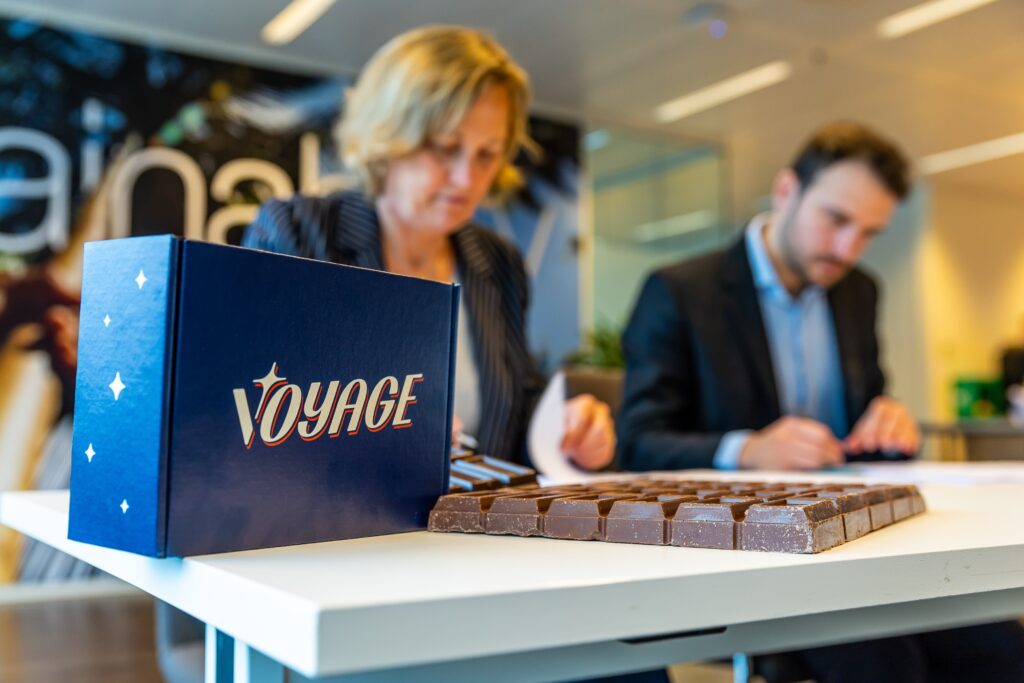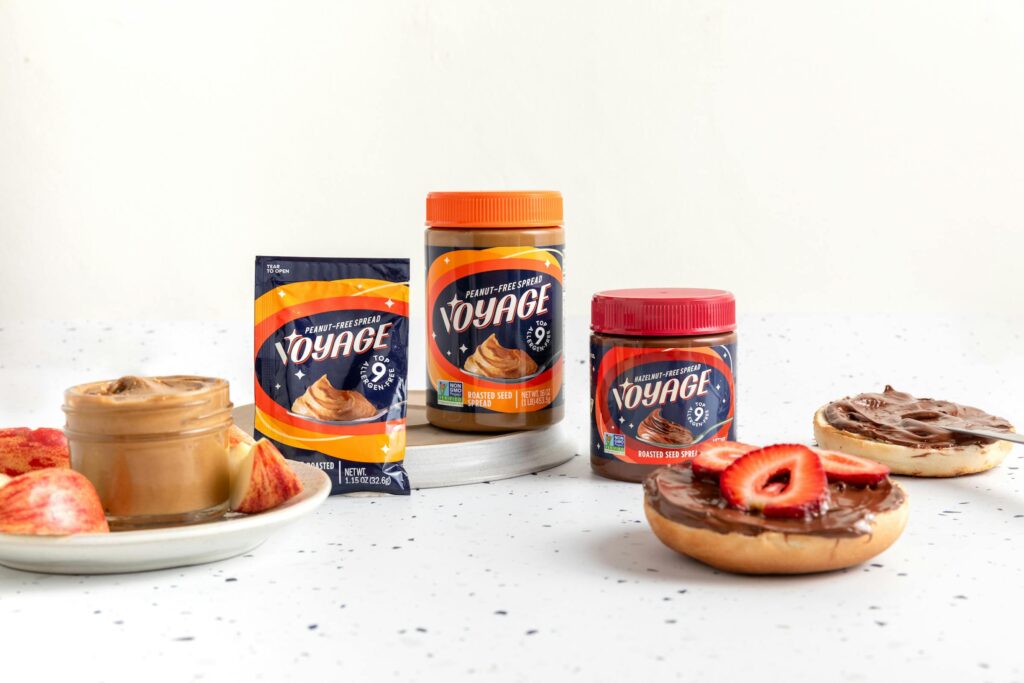Voyage Foods Pens Deal with Cargill to Expand Cocoa-Free Chocolate & Nut-Free Spreads
5 Mins Read
Californian ethical pantry startup Voyage Foods has signed a commercial deal with food conglomerate Cargill to scale up the production and distribution of its cocoa-free chocolate and nut-free spreads.
Cargill has announced a commercial partnership with Voyage Foods to extend its confectionery portfolio by entering the cocoa-free chocolate market for the first time.
The deal means Cargill – the largest privately held company in the US – will be Voyage Foods’ exclusive global distributor for B2B services, providing food manufacturers with allergen-free, climate-friendly ingredients for use in a variety of applications, at a time when chocolate prices are soaring.
“Cargill is proud to partner with Voyage Foods, investing in the next generation of even more sustainable food solutions,” said Inge Demeyere, European managing director of bakery, ice cream and chocolate confectionery at Cargill. “We want to be our customers’ main source of inspiration and growth, setting new standards for innovating and collaborating. To do this, we’re anticipating future trends by focusing on exciting, high-value categories such as ice cream, sweet bakery and chocolate confectionery.”
But it’s not just chocolate – the partnership will also give Cargill’s customers access to Voyage Foods’ nut-free peanut and hazelnut butters. The range will be available in Europe initially, before expanding into other regions later.
Cargill enters cocoa-free confectionery world

Cargill’s extensive confectionery portfolio includes chocolate, coatings and fillings, starches and sweeteners, and oils and fats for bakery, ice cream and chocolate categories – but these can now be complemented with a broader range of ingredient solutions that are vegan-friendly and free from nuts.
“Voyage Foods has always been focused on solving human and environmental health challenges through food. The best way to accomplish this is by supplying the world’s food brands and manufacturers with our impactful ingredients,” said Voyage Foods CEO Adam Maxwell, who co-founded the startup with R&D head Kelsey Tenney in 2021.
The company uses a proprietary technology to turn a base of grape seeds, sunflower protein, RSPO-certified palm oil and shea kernel oil into a chocolate-like compound product. While the cocoa-free chocolate is targeted towards B2B applications, its nut-free hazelnut and peanut spreads are available in over 1,400 retail locations, and it also makes beanless coffee for foodservice.
In January, the company closed a $22M funding round, taking its total amount raised to $64M. The plan is to use the money to scale up manufacturing and launch new products to the market, something that the partnership with Cargill will help facilitate.
“Partnering with Cargill, a leader in the food industry for over 100 years, is the perfect way to scale these solutions globally to offer food manufacturers the ability to integrate cocoa-free confectionery and spreads, produced with no nut or dairy allergens used in the recipe formulation, into their portfolios,” said Maxwell. “Together, we’re amplifying our impact on people and the planet.”
Demeyere added: “Alternatives to cocoa-based products are a great accompaniment to the traditional chocolate solutions that Cargill offers its customers. This partnership is just one of the many ways that we are future-proofing our portfolio and meeting consumer demands and market regulations when it comes to even more sustainable options.”
Voyage Foods will help lower Cargill’s Dutch-sized footprint

Cargill, which raked in $177B in revenue last year, has an extensive record of investing in climate-friendly food companies, including ENOUGH, UPSIDE Foods, Aleph Farms, Wildtype, Cocuus, Bflike, and Cubiq Foods. But it is one of the four largest meat companies in the US, and has driven deforestation, pollution, climate change and exploitation “at a scale that dwarfs their closest competitors”, according to Mighty Earth chair and former US Congressman Henry Waxman, who called it “the worst company in the world” in 2019.
The company has pledged to cut greenhouse gas emissions in its North American beef supply chain by 30% by 2030, although that could prove tricky considering its climate footprint was once found to be greater than the entire nation of the Netherlands. But partnering with Voyage Foods, whose products have been called “the most sustainable chocolates ever to come to market”, will help its case.
An independent life-cycle assessment of its products found that Voyage Foods’ non-dairy milk chocolate produces 66% fewer GHG emissions from land use change and 84% fewer emissions overall compared to its conventional counterpart, while the cocoa-free semi-sweet chocolate reduces land use change emissions by 88% and overall GHG emissions by 81%.
If only 5% of the world switched to its alt-chocolates, it would be the equivalent of saving emissions from between 1.5 and 1.8 million cars annually. And when it comes to water consumption, Voyage Foods’ chocolates use 99% less water – that’s like saving between 500,000 and 1.2 million Olympic-sized swimming pools’ worth of water, if 5% of the population swapped conventional for cocoa-free chocolate.
Climate change and chocolate have ravaged each other. Producing cocoa generates more emissions than all foods bar beef, while extreme weather events have strained supplies of the crop and put a third of cocoa trees on the brink of extinction. This – alongside increasing demand globally – has pushed the prices of chocolate to an all-time high, with cocoa costing $10,000 per tonne last month.
It makes the case for alternatives like Voyage Foods and its counterparts, which include WNWN Food Labs (UK), ChoViva (Germany) and Foreverland (Italy). California Cultured, meanwhile, is working on cell-based chocolate.
Voyage Foods says it provides manufacturers with supply chain and price stability that enables better margins, thanks to the use of cost-effective upcycled ingredients that are scalable. This enables CPG partners to offer eco-friendly, ethical chocolate with fair and stable prices.
“We’re proposing that food companies can make more sustainable and ethically sourced products at a cost that on the industrial side is significantly less than current alternatives,” said Maxwell.




